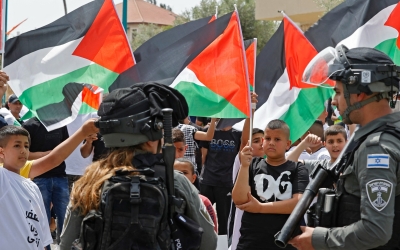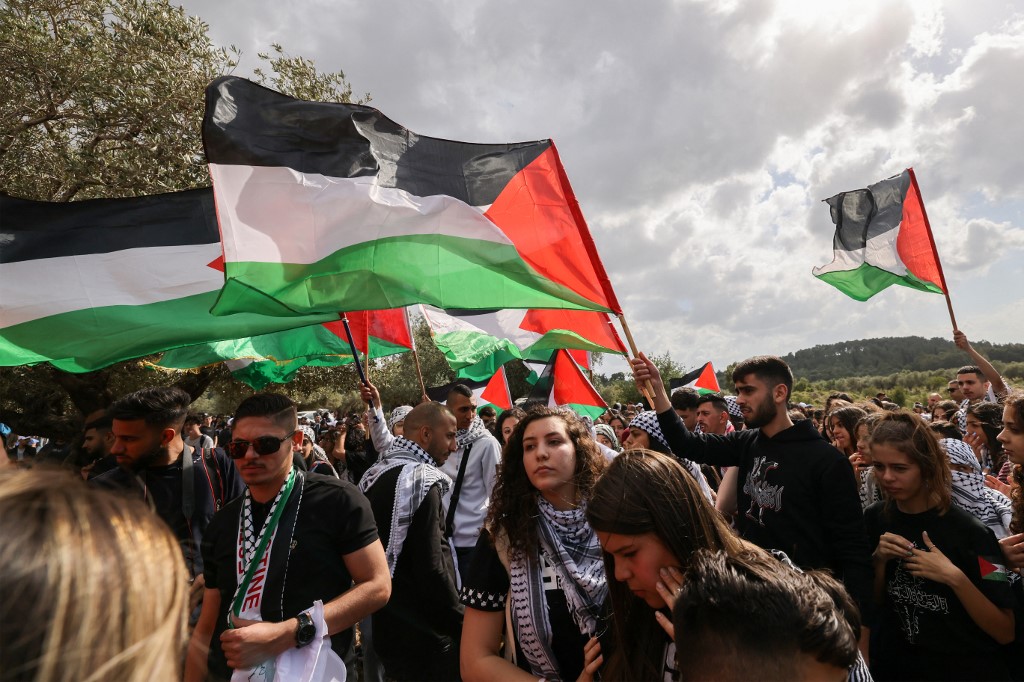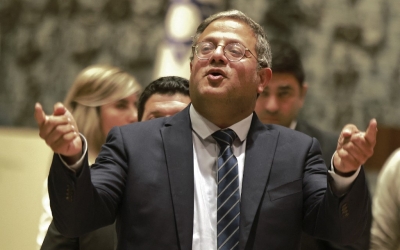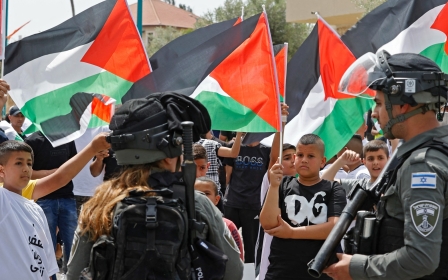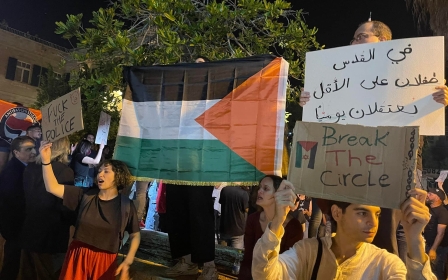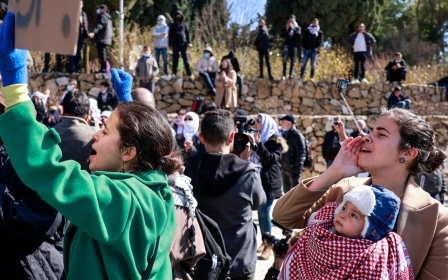Palestinian citizens of Israel are facing a judicial war
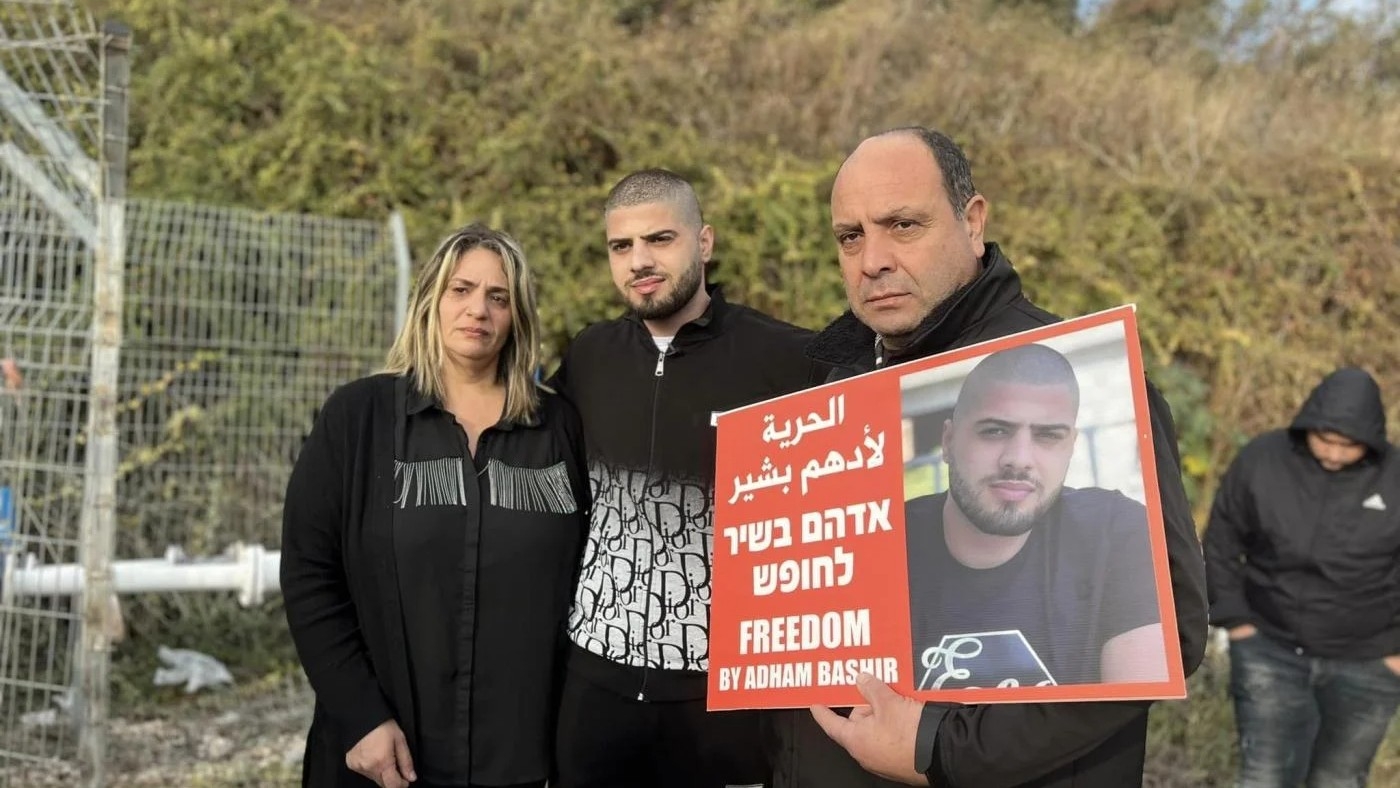
Israel’s ruling establishment did not have to wait for the political ascension of the far right and Religious Zionism parties to carry out a campaign of judicial aggression against its Palestinian citizens.
Right-wing forces have already increased their influence and now control every area of governance and of the state due to the infrastructure of the Israeli occupation and a racist judiciary.
The Israeli judiciary treats Palestinian protests as anti-state riots, while whatever the Israeli Jews do is considered freedom of expression
The aggressive escalation against Israel’s Palestinian citizens is nothing new; it is taking place at the order of the highest levels of the national security apparatus.
In May 2021, Israel carried out mass arrests of Palestinian citizens who protested its latest assault on Gaza. As part of its "Guardian of the Walls" operation, Israel waged a domestic judicial war against its Palestinian citizens to suppress the people’s involvement in the Karamah "dignity" uprising - which signalled a new revolt within the so-called Green Line and brought the 1948 population into the wider movement for liberation.
Through violent arrests, torture, prolonged detention, interrogation, and isolation, Israel sought to exhaust and defeat the protesters.
New MEE newsletter: Jerusalem Dispatch
Sign up to get the latest insights and analysis on Israel-Palestine, alongside Turkey Unpacked and other MEE newsletters
Harsh sentencing
Palestinian activist Adham Bashir, an activist from Akka (Acre) was one such protester who was arrested during the 2021 uprising and sentenced to 10 years in prison.
In a 28 November statement to Radio Shams, he said: "They sentenced me to 10 years in prison [...] and imposed much higher sentences on seven other young men from Akka who are facing the same charges. I confessed in the interrogation at the Shin Bet [headquarters] that I threw a stone, but they charged me with 'terrorism' because I threw a stone at the people who attacked us Arabs [first]".
In the same radio broadcast, Knesset member Ahmad Tibi commented on the harsh sentences: "A new clause relating to the support of 'terrorism' has been introduced to the list of charges against Arab protesters, while the Jewish people who incited the Arabs are exonerated."
Defence attorney Khaled Muhajna, who represented many of the May 2021 defendants, said that the main "anti-terrorism" clause in the Palestinian detainees' files is serious and sentencing could potentially extend to 20 years in prison.
Discussing the 13 detainees from the village of Zalafa near the city of Umm al-Fahm, he stated that everyone who was released was either confined to house arrest, or had a high bail set, and that "no file has been closed".
On Tuesday, Bashir, who was held under house arrest for more than a year, was sent to prison. He took a plea bargain and was sentenced by the District Court of Haifa to 10 years in prison and ordered to pay NIS 150,000 (approximately $43,000) in damages.
The public prosecutor sets these prohibitive financial penalties despite knowing the economic hardship that Palestinians in Akka often face due to the racial and religious discrimination they face in Israeli society.
Anti-Arab incitement
The Palestinian families in Akka still remember clearly the bloody attacks against them from members of the Torah Nucleus Movement (Garin Torani) during the evening of Yom Kippur on 8 October 2008.
The organisation was formed by soldiers belonging to the Zionist religious movement and has spread to Arab-Israeli "mixed" neighbourhoods with the aim of curbing the expansion of the Palestinian population. These attacks by Jewish extremists against the Arab presence in the city have only intensified, particularly over the last year.
The state has largely given these organisations cover - only prosecuting Palestinians who were protecting their communities while failing to summon any of their Israeli attackers to court. Bashir did not leave Akka to confront anyone and had not even left his home when it was violently attacked by organised groups of armed and unarmed Israeli Jews.
For defending himself and his community against the racist attackers, Bashir faced the wrath of Israel's judicial authority which issues verdicts based on its ethno-nationalist agenda.
Whereas the Israeli judiciary views a stone, knife, or even a firearm in the hands of an Israeli attacking a Palestinian as acceptable, that same judiciary considers a stone in the hand of a Palestinian in the 1948 territories as a deadly weapon and an attack on the state, even if he were acting in defence of himself and his home.
It treats Palestinian protests as anti-state riots, while whatever the Israeli Jews do is considered freedom of expression.
A separate system of justice
In practice, the spirit of the Nation-State Law has become the standard for the Israeli judiciary. This was expressed by lawyer Tayseer Shaaban, who defended dozens of youth from Lydd (Lod) when they were protecting their neighbourhoods - and existence - from gangs of Jewish settlers.
The public prosecutor charged them with serious crimes, including "terrorism". On the other hand, those who killed Mussa Hassouna, a young man from Lydd, remain free after the public prosecutor's office released them on the pretext of a lack of evidence, a justification reserved for Israeli Jewish defendants.
Since May 2021, Israel has escalated its strategy of using imprisonment as deterrence, targeting youth activists, and handing out fines that could total millions of shekels
After Bashir's verdict was issued, Shaaban observed on his Facebook page: "When there's an Arab victim of a lynching in the city of Bat Yam, the Israeli Jewish attacker receives a sentence of 20 months, whereas, in the case of a Jewish victim of a lynching in Akka, the Arab attacker is handed a 10-year sentence."
The sentence Bashir received is considered one of the most severe amongst those that have been issued so far both in terms of the financial penalty and number of years in prison.
It is expected that some of the forthcoming sentences will be up to 20 years or more.
From hundreds of charges that the public prosecutor has submitted to the court, so far, relatively few verdicts have been issued against Palestinian defendants. Yet, what distinguishes these verdicts is the degree of exaggeration of the severity of the charges.
Taken together, the criminal cases brought by the Israeli government amount to a strategy of judicial warfare against its Palestinian citizens as collective punishment for their role in the Karamah Uprising - using imprisonment as deterrence, especially targeting youth activists, and handing out fines that could total millions of shekels.
In addition to Bashir, Adam Sakafy from Haifa was sentenced to eight years in prison, Yazan Harb from Haifa to seven years; Adam Omar from Haifa to three years and two months, and three others were sentenced to three years each.
The same court also sentenced an initial group of defendants from the town of Tamra: Mohamed Abu al-Hayjaa, Mohamed Abu Romy, and Bahaa Abu al-Hayjaa, each to seven years in prison, and Ibrahim Mreeh to five years.
Judicial 'aggression'
The mass arrest campaign that began during the Karamah Uprising last year continues as hundreds of cases move through the court system.
On 22 September, the public prosecutor announced criminal charges against six young men from Taybeh.
In a February 2022 interview, attorney Marwan Abu Freeh from Adalah, the Legal Centre for Arab Minority Rights in Israel, spoke about the arrests of 193 young men, university students, and schoolchildren in the Naqab, located in the south.
He explained that he and a team of lawyers advocating for the release of the minors have encountered police objections in court: "For every order to release a minor, the police submitted a request to block the order from being implemented so that it could submit an appeal against the release order. We faced around 45 appeals [from the police and the prosecution] since the beginning of the campaign of arrests against the release orders of young men and minors."
Since May 2021 and after the Naqab (Negev) uprising, the aggression of Israel's police and security forces against Palestinian citizens has only increased with the support of political orders from the government, national security institutions, and far-right parties. In its judicial war against 1948 Palestinians, Israel has designated all protest as a terrorist act against the state carrying the harshest punishment.
Following the Israeli elections last month and the increasing Religious Zionist control over government, the media, the judiciary, and the police, Palestinians are expecting yet another dangerous escalation.
Will the international community boost the morale of the younger generations that the state is seeking to terrorise and deter?
This vulnerable population within Israel can only be defined as "a community under threat" and has no choice but to engage in a public struggle to stop the political, judicial, and police aggression against them, and turn to the international community for support, including the International Criminal Court (ICC).
But as the Palestinian citizens of Israel fight for their rights both in a discriminatory legal system and in an international court that has largely ignored them, the most important matter is whether this community will find global solidarity with their popular struggle.
Will the international community boost the morale of the younger generations that the state is seeking to terrorise and deter? Will it reinforce the resilience of the 1948 Palestinians in their homeland - especially in the coastal cities and the Naqab where ethnic cleansing schemes undergird these discriminatory legal judgements?
The views expressed in this article belong to the author and do not necessarily reflect the editorial policy of Middle East Eye.
Middle East Eye delivers independent and unrivalled coverage and analysis of the Middle East, North Africa and beyond. To learn more about republishing this content and the associated fees, please fill out this form. More about MEE can be found here.



